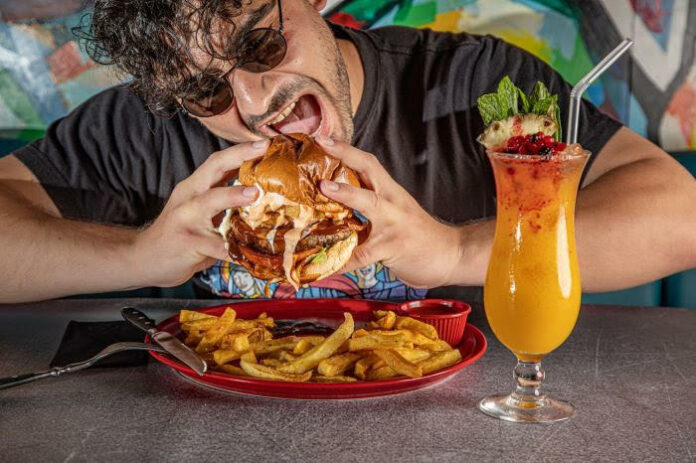Everyone eats the equivalent of three extra cheeseburgers a day than they admit – regardless of their waistline, researchers have revealed. The study shows obese and thin people all fib about food to the same amount, regardless of the number on the bathroom scale, and this could be undermining national health advice.
University of Essex researchers took into account the amount of energy a person burns in a day, with everyone misreporting how many calories they consume by an average of 900 calories.
It found that as obese people burn more energy doing day-to-day tasks, they do not lie about food more than slimmer people. Although the gap in reported meals and actual intake was bigger in obese people, they actually burn more calories than non-obese people.
This casts doubt on the official guidelines that claim Britain’s bulging waistlines are due to obese people not telling the truth about their diet.
And it comes amid controversy sparked by the government backtracking on a proposed ban on “buy one get one free” junk food deals and a 9pm watershed for sugary snacks.
The researchers hope the findings, published in the American Journal of Human Biology, will shake up guidelines on energy intake.
The team, led by Professor Gavin Sandercock from the School of Sport, Rehabilitation, and Exercise Sciences, said: “The gap between reported intake and actual expenditure was bigger in obese adult. Instead, it was because they expended much more energy each day than their thinner peers.
“Bigger bodies need more energy every hour of the day, particularly during physical activity, because moving your weight is hard work.
“We used an innovative mathematical model to correct for the difference in body size between obese and non-obese adults. When we took into account the different body size and the different energy needs they have, there was no difference in how much they under-reported their food intake
“The idea that obese people lie about their food intake is wrong. It’s simply that as energy requirements increase with a larger body size, there is more error between what people report and what they actually eat.”
The study looked at 221 adults with an average age of 54 and a range of body shapes.
Researchers asked them to keep a food diary and then checked how much energy they consumed by using radioactive water and testing the urine of participants.
Although obese people misreported how much they ate by an average of 1,200 calories and slimmer participants by 800 calories, they actually burnt 13% or 400 calories more energy.
Everyone lied, whether they were obese or non-obese, about how much they consumed by the same amount – claiming they consumed 1,800 calories on average.
As a result of the study Sandercock is calling on the government to overhaul its advice. He said: “Public health recommendations have historically relied heavily on self-reported energy intake values
“Recognising that the measures of energy intake are incorrect might result in the setting of more realistic targets. Additionally, changing the narrative around obese people fibbing about their energy intake might change the focus to investigating dietary risk factors for obesity, such as foods with high-energy density, processed foods, high-fat low-fibre foods and sugary beverages, all of which drive a high energy intake.”
900 calories in numbers
3 – McDonald’s Cheeseburgers
5 – Pints of beer (average of each – 568ml)
7 – Packets of salted crisps
18 – Apples
300 – Cherry tomatoes_
Study details
Obese individuals do not underreport dietary intake to a greater extent than non-obese individuals when data are allometrically‐scaled.
Sally Waterworth, Catherine Kerr, Christopher McManus, Rianne Costello, Gavin Sandercock.
Published in the American Journal of Human Biology on 8 March 2022
Objective
The aim of this study was to assess the extent of misreporting in obese and non-obese adults on an absolute, ratio-scaled, and allometrically-scaled basis.
Method
Self-reported daily energy intake (EI) was compared with total energy expenditure (TEE) in 221 adults (106 male, 115 female; age 53 ± 17 years, stature 1.68 ± 0.09 m, mass 79.8 ± 17.2 kg) who participated in a doubly-labeled water (DLW) subsection of 2013–2015 National Diet and Nutrition Survey. Data were log transformed and expressed as absolute values, according to simple ratio-standards (per kg body mass) and adjusted for body mass allometrically. Absolute and ratio-scaled misreporting were examined using full-factorial General Linear Models with repeated measures of the natural logarithms of TEE or EI as the within-subjects factor. The natural logarithm of body mass was included as a covariate in the allometric method. The categorical variables of gender, age, obesity, and physical activity level (PAL) were the between-factor variables.
Results
On an absolute-basis, self-reported EI (2759 ± 590 kcal·d−1) was significantly lower than TEE measured by DLW (2759 ± 590 kcal·d−1: F1,205 = 598.81, p < .001, ηp2 =0.75). We identified significantly greater underreporting in individuals with an obese BMI (F1,205 = 29.01, p <.001, ηp2 =0.12), in more active individuals (PAL > 1.75; F1,205 = 34.15, p <.001, ηp2 =0.14) and in younger individuals (≤55 years; F1,205 = 14.82, p < .001, ηp2 =0.07), which are all categories with higher energy needs. Ratio-scaling data reduced the effect sizes. Allometric-scaling removed the effect of body mass (F1,205 =0.02, p = 0.887, ηp2 =0.00).
Conclusion
In weight-stable adults, obese individuals do not underreport dietary intake to a greater extent than non-obese individuals. These results contradict previous research demonstrating that obesity is associated with a greater degree of underreporting.
See more from MedicalBrief archives:
Calorie restrictive diet may protect against age-related disease
The pros and cons of intermittent fasting to lose weight
Unsaturated fat improves cholesterol but not weight loss – research review
Obesity not always linked to metabolic change

